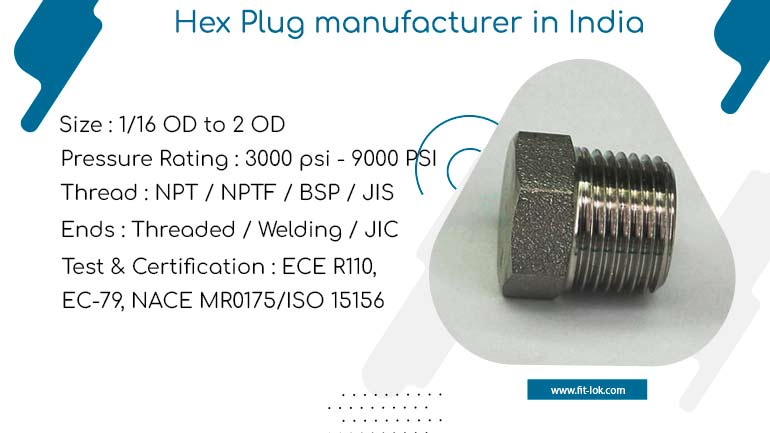What Are Hex Plugs and How Do They Work

Hex Plugs: What Are They and How Do They Work?
A hex plug is a type of mechanical fastener commonly used in various industries, including plumbing, construction, automotive, and engineering. The plug is characterized by its six-sided (hexagonal) shape, which allows it to be easily tightened or loosened using a wrench or socket tool. This specific design gives it a strong, reliable grip, making it highly efficient for sealing holes in pipes, valves, tanks, and other equipment.
What Are Hex Plugs Made Of?
Hex plugs are made from a variety of materials, chosen depending on the application they are designed for. Common materials include:
- Steel: Often used in industrial settings, steel hex plugs are durable and able to withstand high pressure and temperatures.
- Brass: Brass hex plugs are commonly used in plumbing applications due to their resistance to corrosion and their malleability.
- Stainless Steel: Stainless steel hex plugs offer superior corrosion resistance, making them ideal for use in environments where exposure to moisture or chemicals is a concern.
- Aluminum: Lighter than steel and brass, aluminum hex plugs are used where weight reduction is important but still need a strong, durable material.
- Plastic: For low-pressure applications or when corrosion resistance is necessary in less harsh environments, plastic hex plugs are used.
Common Applications of Hex Plugs
-
Sealing Holes in Pipes and Tubing: Hex plugs are most commonly used to seal the open ends of pipes or tubes. They create a tight seal, preventing leaks of gases, liquids, or other substances that may be transported through the pipe.
-
Machine Components: In machinery, hex plugs are used to close off threaded openings in components such as pumps, engines, or tanks. This prevents any contamination from entering the system and ensures that internal pressures and fluids are contained safely.
-
Automotive and Aerospace Industries: These plugs are often used to seal off unused ports or fittings in automotive engines or aircraft systems. Their ability to maintain a secure seal is crucial for ensuring safety in these high-stakes environments.
-
Hydraulic Systems: In hydraulic and pneumatic systems, where high-pressure fluid is involved, hex plugs can be used to close off unused ports or to seal the system during maintenance, ensuring that pressure is maintained and preventing any leaks.
-
Fittings and Accessories: Hex plugs are used in a wide range of fittings and accessories to cap off holes or threads when they are no longer required. This is useful in manufacturing processes, product testing, and general maintenance.
How Do Hex Plugs Work?
Hex plugs function by providing a tight and secure closure for threaded or non-threaded holes, preventing leaks and contamination. The installation process is relatively simple, as they are designed to be installed using a wrench or socket tool that fits the hexagonal shape. Here's how they typically work:
-
Threaded and Non-Threaded Plugs: Hex plugs can either have internal or external threads, depending on the type of hole they are meant to seal. Threaded hex plugs are screwed into the hole with matching threads to create a seal. Non-threaded plugs, on the other hand, fit snugly into a hole without the need for threading.
-
Installation: When installing a hex plug, the correct size and material must be chosen based on the specific application. The plug is inserted into the hole, and a wrench is used to tighten it. This ensures that the plug sits securely and creates an effective seal.
-
Sealing Effect: The hex plug works by creating a pressure seal against the inner surface of the hole it is sealing. Depending on the design, the plug may have a gasket or O-ring that further enhances the seal, making it even more effective at preventing leaks.
-
Durability: Hex plugs are designed to withstand significant pressure, vibration, and temperature fluctuations. Once installed, they provide a reliable seal, keeping systems functioning properly and preventing any leakage of fluid or gas.
Types of Hex Plugs
There are different types of hex plugs, each designed for specific applications:
-
Pipe Plugs: These are designed for sealing off pipe ends. They are usually threaded to match the pipe’s internal or external threads.
-
Blanking Plugs: These plugs are used in industrial applications to close off openings in machines, valves, or tanks that don’t require a fluid passage.
-
Hex Head Plugs: These are the standard hexagonal plugs that can be tightened or loosened using a wrench. They come in a variety of materials and are designed for general use.
-
Oil Drain Plugs: Used in automotive and machinery maintenance, these hex plugs help drain oil from systems and seal the oil pan after draining.
Benefits of Hex Plugs
-
Easy Installation and Removal: The hexagonal design allows for easy installation and removal using simple hand tools, reducing labor costs and downtime during maintenance.
-
Durability: Hex plugs are built to last, offering long-term reliability even in harsh environments. Whether exposed to high pressure, temperature changes, or corrosive substances, they provide a strong seal.
-
Versatility: Hex plugs come in various sizes, materials, and configurations, making them suitable for a wide range of applications across different industries.
-
Cost-Effectiveness: Their simplicity and effectiveness make hex plugs an affordable solution for sealing, offering a cost-effective alternative to more complex sealing systems.
Conclusion
Hex plugs are essential components used in numerous industries for sealing openings in pipes, machinery, and other systems. Their simple design, durability, and versatility make them an invaluable tool for ensuring system integrity and preventing leaks. Whether you’re working in construction, automotive, or any other industrial field, understanding how hex plugs work and how to properly use them is key to maintaining efficient and leak-free operations.
What's Your Reaction?






























































